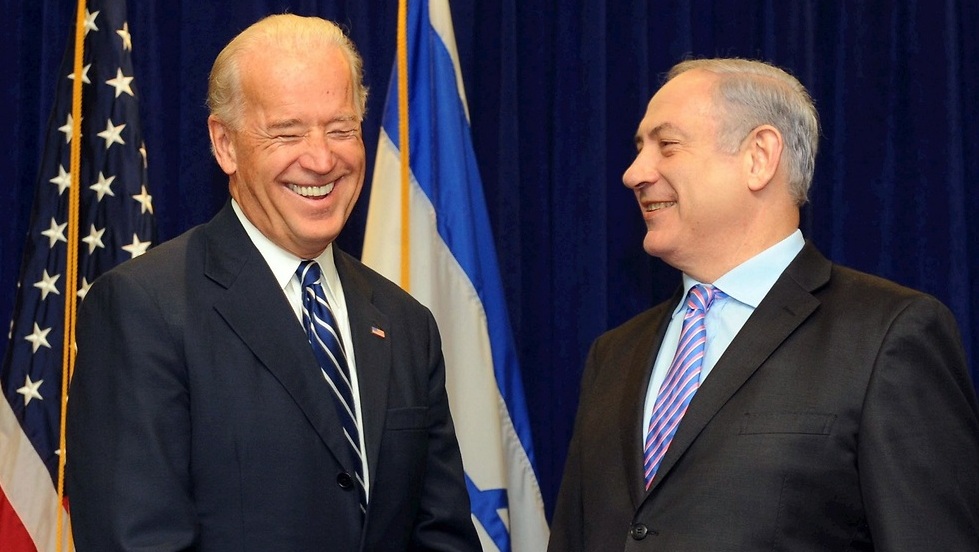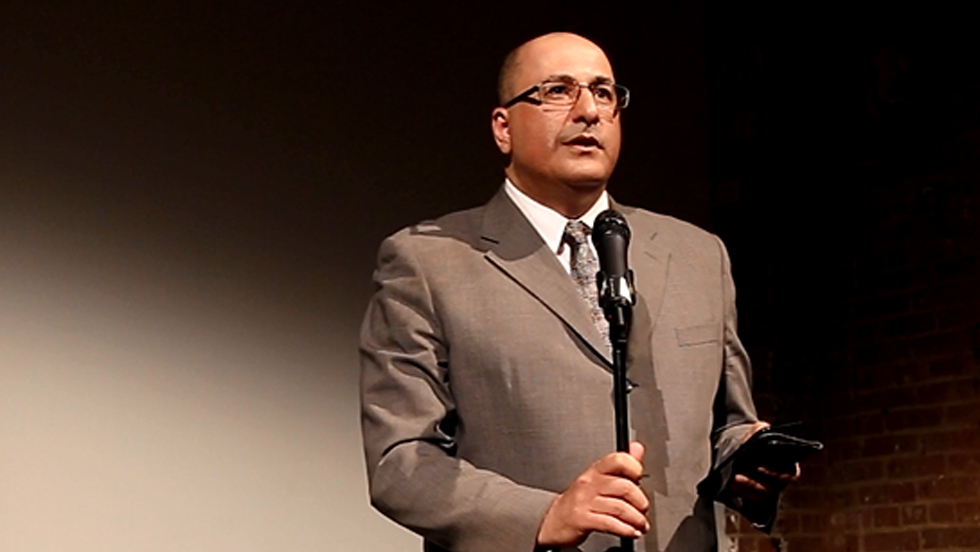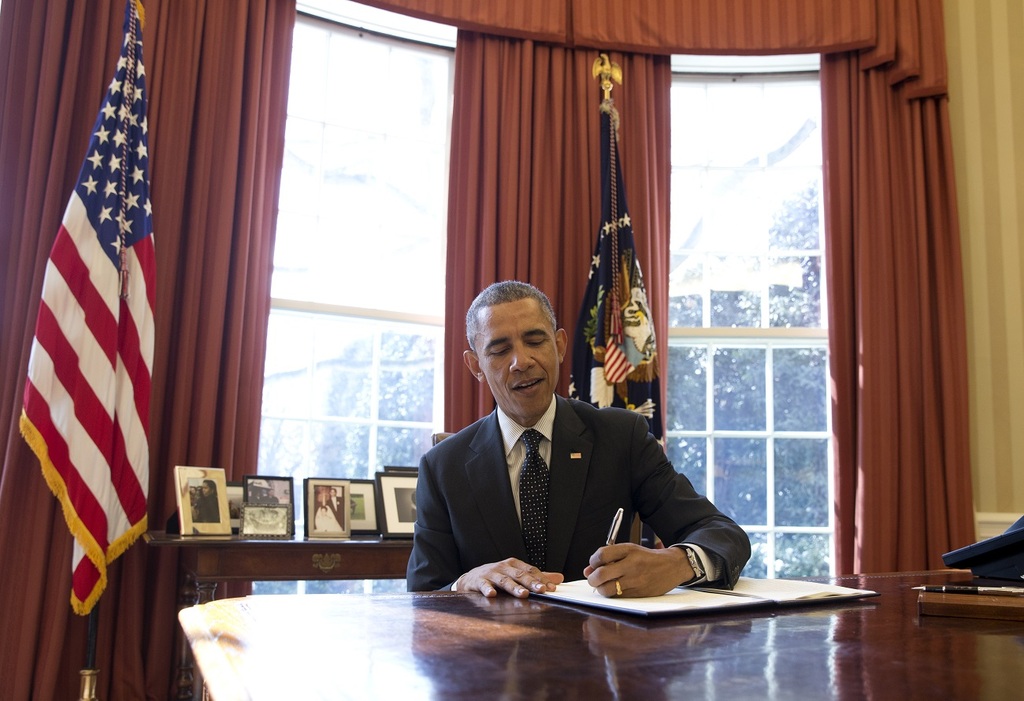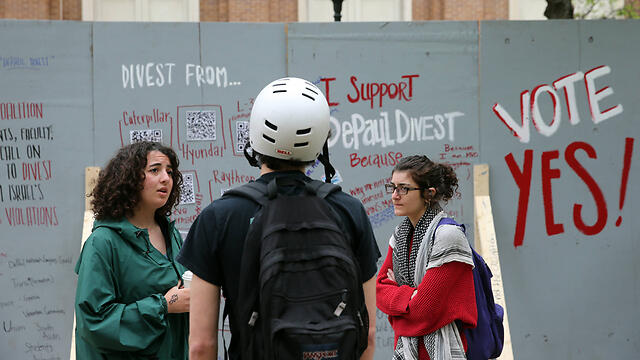Veteran diplomat Ido Aharoni wants to know why Israel did not use of its close ties to former U.S. president Donald Trump to establish a visa waiver system, thinks President Joe Biden has more pressing matters than Israel and insists the United States is far from down to the count.
"It is not perfect, but it is still the most powerful nation in the world," said Aharoni, former Israeli consul in New York and professor of international relations at New York University Graduate School of Arts and Science.
Many Israelis believe that Trump was the best president Israel has ever had. Do you agree?
It is like asking who the greatest basketball player of all time is, everybody has their own.
Trump did what no other president had done before him, and he did so simply for himself being a 'disrupter' and not a politician, but rather a brand who transitioned into politics.
He was the first modern president to break the perception of the U.S. as an honest broker when it comes to the Israeli-Palestinian conflict. In his world, you pay for your mistakes, and therefore the U.S. should feel free to takes sides in the conflict. This is what many Israelis liked about him.
However, it is a mystery to me to why Israel did not utilize its intimate relationship with Trump to get rid of the mandatory visa policy in place for Israelis to enter the U.S.
8 View gallery


Prime Minister Benjamin Netanyahu stands with U.S. President Donald Trump after signing the Abraham Accords at the White House, Sept. 2020
(Photo: Reuters)
How is it that during those years, with everything that took place - the embassy in Jerusalem and so on - we could not get rid of the visa policy. This is of course unless Israel is behind this in some way.
The only explanation is that Israel was not interested, and its leaders did not tell us the truth about it. It is still a 'mystery' to me, but I have no doubt that the explanation is rather simple: Israel was not interested in amending the visa policy for a variety of security concerns.
What do you say about Prime Minister Benjamin Netanyahu and U.S. President Joe Biden's relationship so far?
I do not think they are particularly interested in us right now. The Biden administration has problems more urgent than the Middle East.
Biden was given a nation suffering from rampant neglect, not just during Trump's tenure but with former presidents Barak Obama and George W. Bush playing a part in it.
A line of administrations did not invest at all in strengthening the country's socioeconomic infrastructure. This is grave neglect and all who live there have experienced it in one way or another.
8 View gallery


Then-U.S. VP Joe Biden meeting with Benjamin Netanyahu during a visit to Israel in 2016
(Photo: GPO)
Biden not only has to deal with this and with the societal rifts, but also with the pandemic and climate change, which he himself put at the top of his priorities list.
This requires very complicated international diplomacy, which will take a lot of energy from him. When you look at the relative benefit of the Middle East when it comes to climate change, i.e. fuel, the region is not a big priority and we do not attract much interest.
By the way, we never were such a big deal for the U.S. as we think we do, but that is a different matter altogether.
How would you say Israel is perceived in the U.S. today? High levels of support, but not forever?
This is a very interesting question because it touches the heart of U.S.-Israel relations. The story here is not political support, which is the fatal mistake Israel has made for years.
When you pit Israel against the Palestinians anywhere in the world, excluding classical Europe, the results will always be in Israel's favor. The reasons are mainly religious – the U.S. is a predominantly Protestant nation with at least 56% of its citizens following the faith.
Their relationship to Judaism is vastly different to that of Catholicism. It is from this that Israel experiences so much support among Christians.
8 View gallery


U.S. Evangelist John Hagee leads a march of Christians in support of Israel in Jerusalem
(Photo: AP)
However, this question is no longer really relevant. It has already been proven by several Nobel laureates that you can function perfectly fine when there is an internal detachment between the emotional and the rational. If I may not agree with you rationally but be attracted to what you represent emotionally.
Israel has never taken into consideration this complexity and therefore the question of 'do you support me politically or not' - is irrelevant since it does not try to understand human behavior.
How do I know this? When looking at the amount of dollars coming from the U.S. to Israel – it does not even scratch the real potential. A country like Israel, which is home to so much innovation, needs to see at least a quarter of a trillion dollars in foreign investment every year.
The U.S. has around 5,500 universities and some 23 million students, a million of whom travel to learn abroad every year. Only less than 3,000 come to Israel, and why is that? How has this not become a strategic goal for Israel, to bring in 100,000 students every year? That could really change the economy.
Take tourism for example. We were at a peak of 5 million tourists a year, but reports said that we could have easily bumped that number up to around 15-20 million. Why didn't this happen?
Because Israel only presents itself through the prism of global crises. You cannot go around the world saying, 'we are on the verge on annihilation – but we have amazing beaches.'
This just does not work. Either you are the victor or the victim, and this duality frustrates many who work in the field. Israel is working in contrast to the basic ideas of marketing – you have to know what your advantages are.
The moment you know what those advantages are – Israel’s being its boundless creative spirit - and you run with it, good things will happen.
Any deviation from this will sabotage the ultimate goal of growth and prosperity. And this will have impact on the economy, culture and image of Israel.
Currently, all of these things happen on the sidelines because of the connections Israelis have around the world. Even in culture, where we see a wonderful renaissance of Israeli-made content in Hollywood, but this is because of the direct ties between Israeli creators and their global counterparts.
How can Israel talk to the younger progressive wing of the Democratic Party? Can such a dialogue even take place?
It can. The U.S. is going through very deep processes of secularization, a takeover of politics by a coalition of minorities.
Biden might be the swansong of the old political establishment, after him we can expect a new political apparatus of minorities, which I think during the age of post-Trump will also take control over the Republican Party. The discourse will be completely different – minority and rights.
The key term when talking to the younger generations is 'relevance'. As long as Israel manages to do this, it would be an important talk in their discourse. They will listen.
The moment Israel is no longer part of their discourse; they will lose interest. Israel is now perceived as a nuisance, constantly whining about its problems, but is not part of the discourse around climate change, which is the most important issue globally.
Climate change is barely talked about in Israel – we are days away from an election and no one even said a word about it. This is what interests the younger generation.
Even issues like civil rights are nowhere on Israelis' radar. Israel has its own public discourse and political agenda, but as long as it does not click with younger Americans and Europeans, we will never be able to increase our relevance with them.
Look at Tel Aviv for example, how it managed to create a true, fruitful and intensive dialogue with the LGBT community, especially in Europe. This is possible. We are just not there when it comes to Israeli society.
How do we bolster ties with the African American community?
I see a difference between party politics, which most American do not care about, and their overall perception of Israel.
Though the situation is not favorable from a diplomatic or political point of view, Zionism has never been more vogue in the U.S. than now – and Israel has never enjoyed such a favorable standing in the world as a whole.
Many events led up to this. Among them the 9/11 attacks that changed the balance throughout the U.S. and the Western World. Steve Jobs also helped this in a way when he presented the first smartphone in 2007 and allowed millions of Israelis to communicate their country on a global stage, sharing their experiences and values in a way completely independent of classic mediators like we had for the Palestinian conflict.
Before this communication shift, there were only a handful of pundits who only talked about the Palestinians. This is the key. When Israel communicates with the world through alternative channels, great things happen.
When it comes to the African American community, I do not think the situation is that bad.
The bad news is that many young people have bought into the colonialist narrative, that Israel is the product of the Holocaust, created out of European guilt for the atrocities. Their conclusion is that the Palestinians are innocent people who were forced to pay the bill for the Holocaust.
This manifested in Obama's first Mideast action. He went to Cairo, gave a speech in parliament lending a hand in peace to the Muslim world. Then, instead of going to Israel and making a speech at the Knesset, he went straight to the Buchenwald Concentration Camp memorial.
It’s as if he told us: 'This how I see the balance. The Muslims will get appeasement, while the Jews get a reference to the Holocaust.'
He unknowingly bolstered this inherently anti-Zionist point of view; I mean the Zionist movement already built a prosperous nation in this land years before Hitler rose to power. Ignoring this is the biggest issue.
Young people in the U.S. have adopted this narrative, born in European intellectual circles that was unfortunately given a 'push' by President Obama.
Will Biden's victory and the rise of the liberals risk bolstering the BDS movement in the U.S.?
No, not at all. I call them 'Boycotters of Israel' and they have no real influence. They mainly operate on the sidelines.
Sure, it is true that they give a livelihood to some Jewish organizations that hope to raise a few bucks off the hysteria the issues they create, but the boycotters have no influence.
Israel is not boycotted anywhere in the U.S., it is a myth. Not only is it not boycotted, but Israel was never celebrated in American academia in the first place.
We tell ourselves a story that never happened. I studied and now teach at American universities; never was Israel part of the mainstream of their intellectual-liberal circles. Not before 1948 or after. Zionism was never a leading movement among American Jewry.
Between 1850-1924, over two million Jews immigrated to the U.S., while just a handful to Palestine. The majority of American Jews did not identify with the Zionist movement and it is still the case today.
How much are Jewish organizations involved with the BDS movement? Does Israel need to initiate a dialogue with them?
Contrary to what Israelis believe, Israel's government is not allowed to take any political action inside the U.S. – not on campuses or outside them. If Israel wishes to influence academic discourse, it needs to do so through accepted means, with academic content.
Take Birthright for example. We should take that, but for non-Jewish PhDs. Israel needs to be able to invite the PhDs who write about it, try to formulate a connection with their colleagues here. Israel has nothing to hide. There is no black operation here.
I want to emphasize again, Israel cannot initiate any political activities on campuses, it is against the law. A diplomat who does anything of that sort is going to find him or herself on a plane back home.
Lectures are a different story, but when it comes to campus organizations – the only way to deal with them is academically. There are events organized by students and by the administration. I suggest Israel only works through the administrations.
The problem starts with syllabus on Israel in all relevant fields – social studies, sociology and so on. We do not have any issues when it comes to business, law, or exact sciences - these are our fields.
We just need to systematically show academic Israel to those who write the curricula. I now teach graduate students and I know the nature of this relationship.
Other countries do it, and Israel does not because it assumes that the goal is to win a debate.
This is a mistake; the goal is to build relationships. This is one of the problems of Israeli diplomacy, which has adopted the worldview of the army and sees its role as ‘winning decisively’. True diplomacy is not about 'winning' but rather about forging meaningful relations.
What are your thoughts on the deployment of Israeli consulates in North America? Are there enough?
Israel's foreign policy is very Eurocentric. For Israel, Europe is still the center of the world and the birthplace of many of its fundamental values.
When Israel was founded, Europe was the closest destination and today is still a larger trade partner than the United States. The country's geopolitical orientation since its foundation has been European - for example the special relationship Israel had with France until the 1967 arms embargo.
The strange outcome is that classical diplomacy refers to nations, but for the last 50 – 70 years, mainly after multilateral diplomacy began to decline, with the UN the main symbol of that – global cities emerged as an increasingly impactful actor.
National diplomacy does not know what to do with cities. But I ask you: what is more important to Israel's interests, Finland or Seattle?
Seattle is the home of Microsoft, Amazon, Boeing, Expedia and Starbucks - dozens of the world's most important companies. But Seattle is barely 'covered' by the consulate in San Francisco.
That sort of a city needs specific handling and diplomacy on a national level. In Europe Israel maintains 23 missions, while the U.S. has only nine and in Chinese-speaking countries only five. No one seems to care about this disparity.






